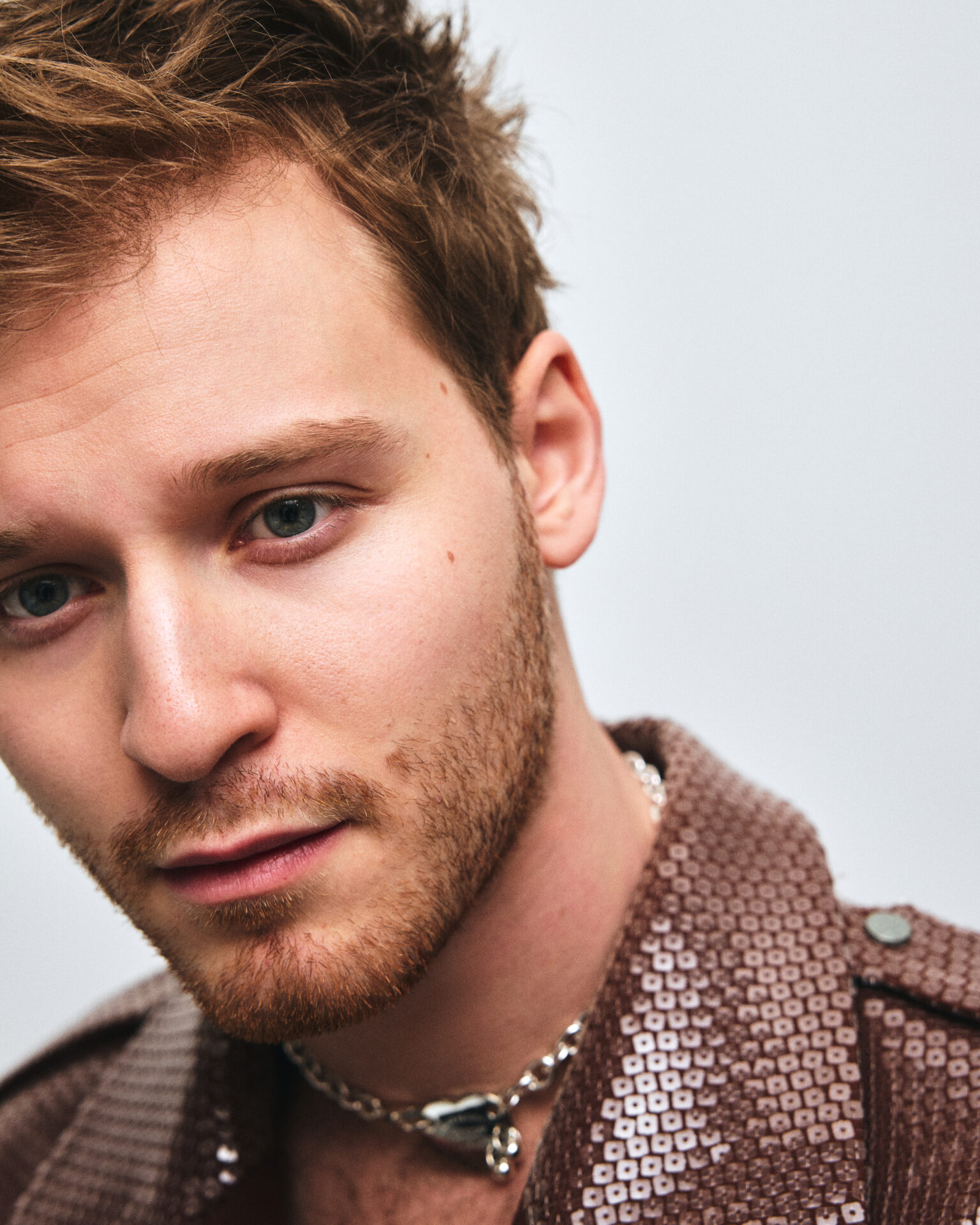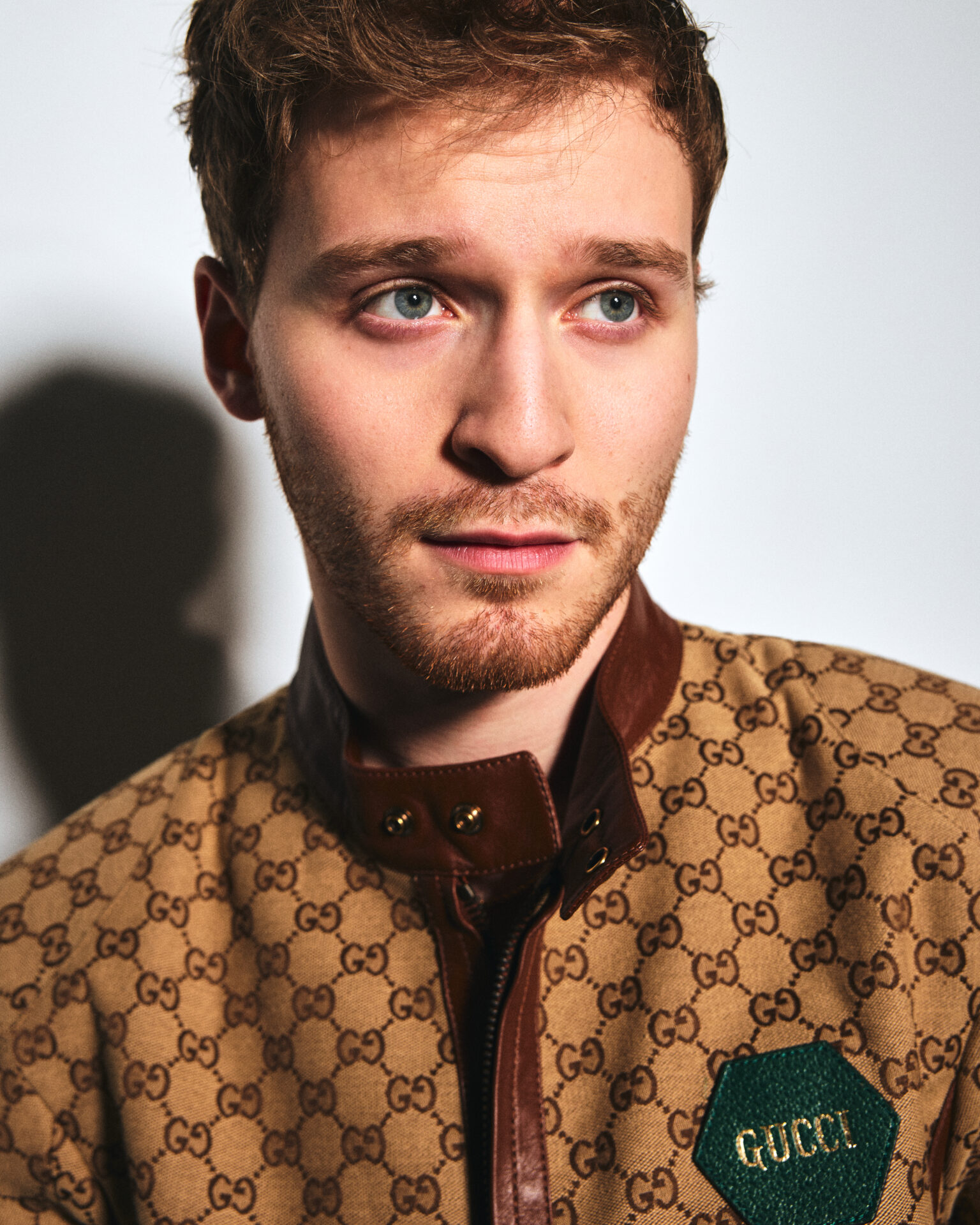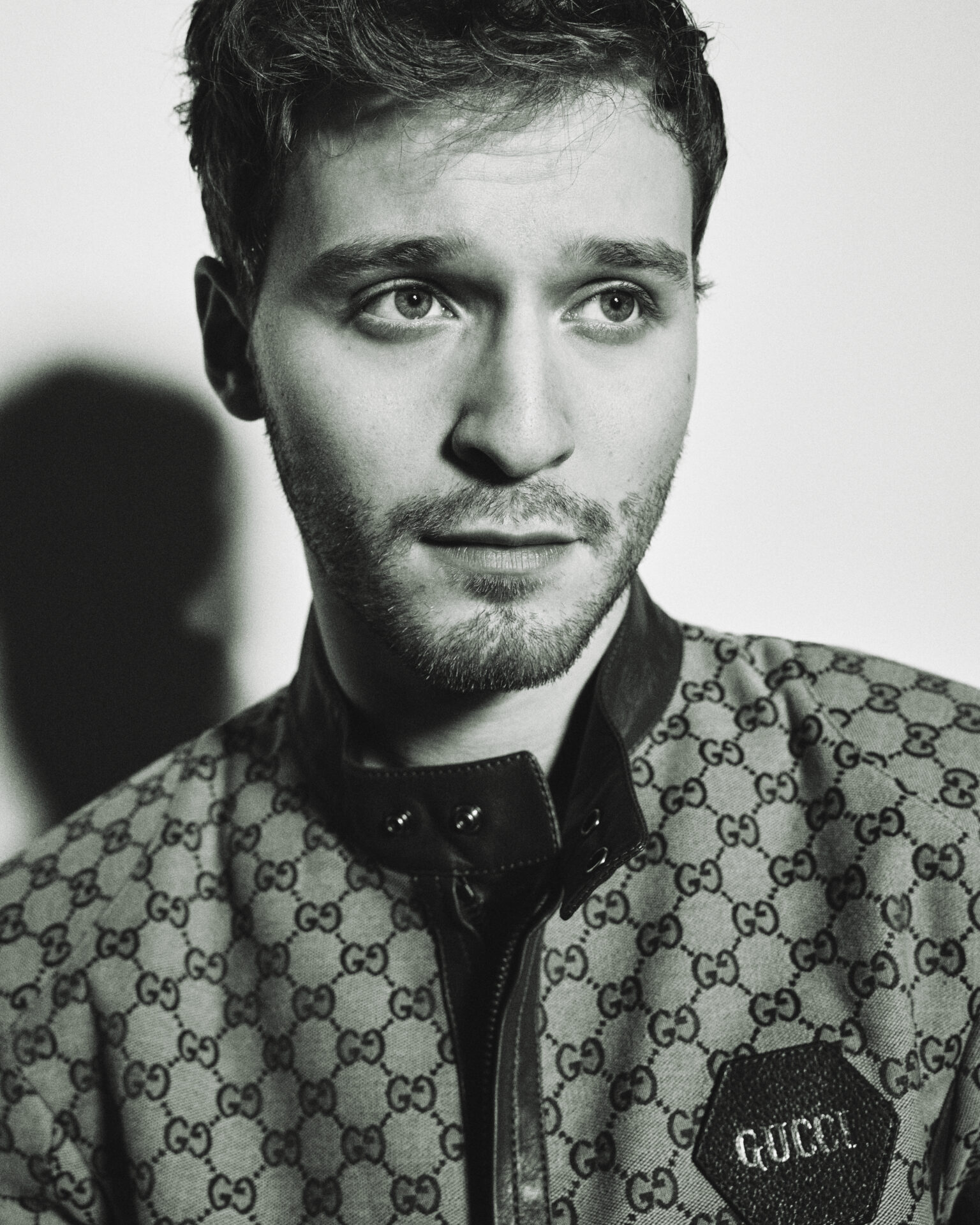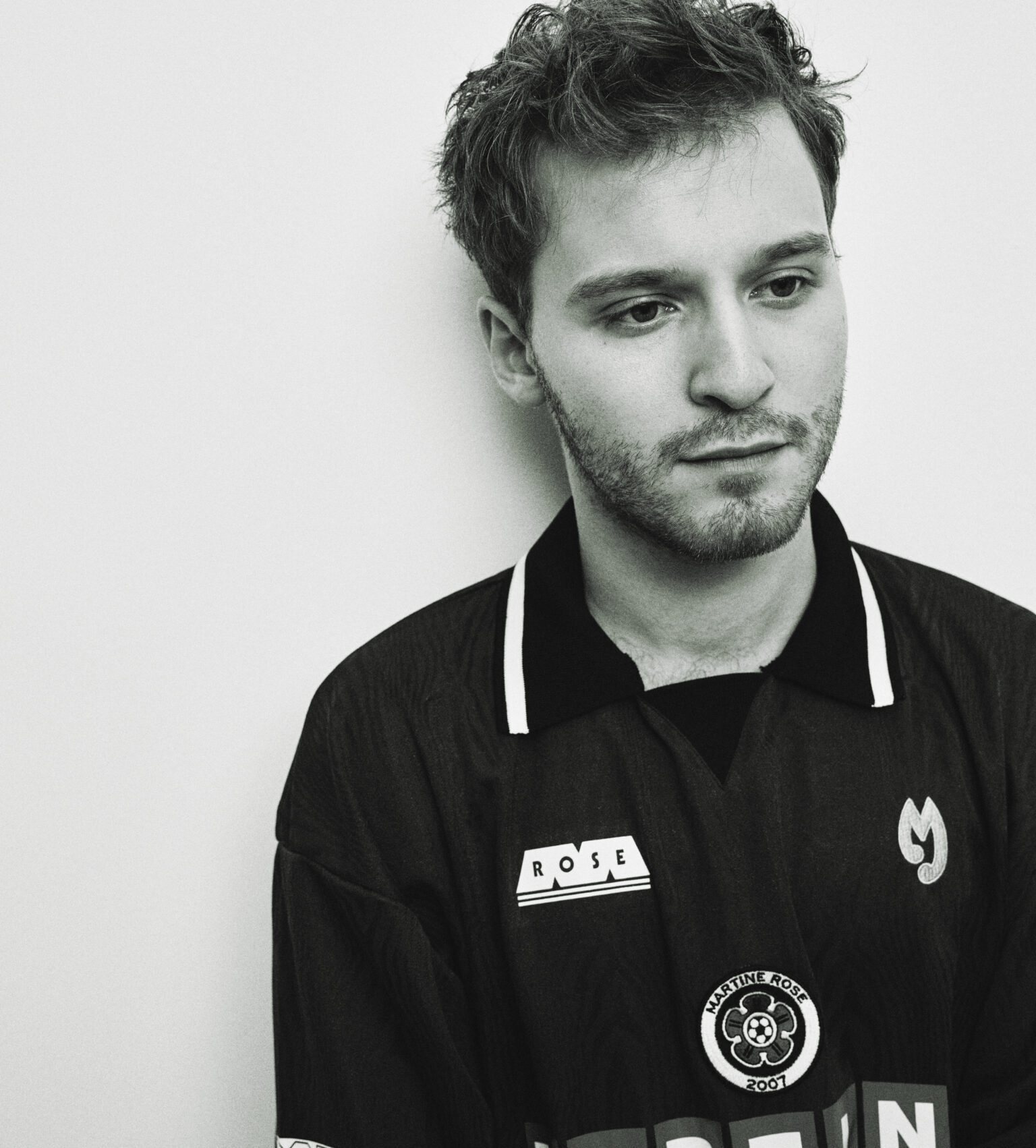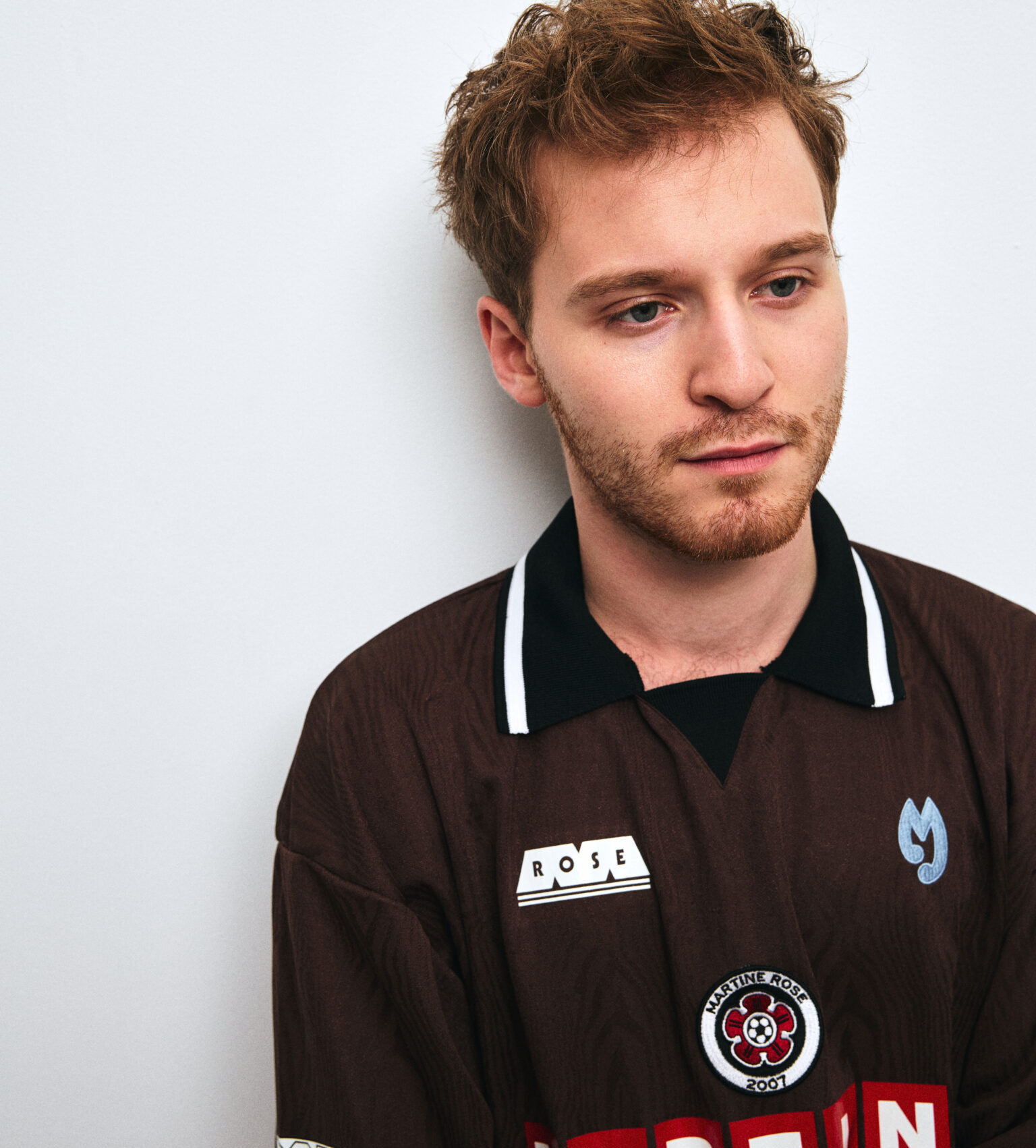The Sweet Disposition of Fred Hechinger
WRITER: Dio Anthony
When Fred Hechinger left his home in New York for summer camp some umpteen years ago, he had high hopes. S’mores by the fire, sweaty nights full of chatter, and the beginning of a profound and indestructible bond with all those he’d share these experiences with. “I realized I wanted the movie
version of things, which has happened a couple times in my life.”
Today, at 25 years old, this facet of his personality remains. He is still seeking this version—except now he’s creating it too. In what seems like a love letter to his younger self, Hechinger is a bona fide actor—adding to an invisible reference list of “movie versions” with every role he takes on and every cinematic universe he helps build. There is a common thread to his it factor, a throughline of sorts. A glimmer that lives within, peeking through with every performance. Talking with Hechinger, I can surmise that this glimmer is one of curiosity, a sensibility that propels him forward, all the while managing to carve out a space for him and only him.
A quick search of his social media profiles quickly reveals that he is part of the rare crowd of young people who are choosing to live offline rather than on. Preferring to create experiences in person and using his phone as a means to do so. This isn’t to say that he’s been formally excused from the tight grip
technology has on us and our attention spans. He simply recognizes it is not where he wishes to spend his time. Lucky for us, he’s too busy being inspired by film and by the collaborators that surround him. Lending his talents and all-consuming love for storytelling to anyone who will listen. And reader, when he’s talking, you really ought to listen.
Fred Hechinger: How’s it going?
Dio Anthony: I’m good! Hanging out. I’m excited to talk to you today. I watched your new film this morning, and I loved it so much.
FH: Thank you so much for watching.I’m so happy about that.
DA: I am too! I instantly had a question about the movie. Those photos in the film of a younger Jason, your character, at camp, they looked exactly like you. Those must have been your actual photos, right?
FH: The ones where Jason is looking kind of wistfully, yeah, in a cabin—there’s one or two that we tried to take. Oh, but actually, no, the ones you’re talking about are from when I was really at camp. I only went to camp as a kid for one summer. It was a fun experience, but I don’t think it meant as much to me as it does to Jason. I kind of wanted to have this relationship with summer camp like that, but in reality, I didn’t feel like it was that way. So, it’s funny that those photos got repurposed within the story.
DA: That’s actually hilarious to me. I know that sometimes productions can alter a photo to suit the story. However when watching this scene you just mentioned I felt that this had to be a real moment–an actual photograph from your life. I’m curious why you only attended for one summer? And What sticks out to you from that whole experience in general?
FH: That’s a great question. I thought of this romantic idea of summer camp, and then I got there, and it was more sporty than I am. It felt more varsity sports centered. I wanted to be around the campfire. I think what I realized, which has happened a couple times in my life, is that I really like the movie version of it, you know? I wanted to go to the movie version of a summer camp. Then when I got there, it was all these sports and I couldn’t even watch movies. I remember being like–oh, I kind of miss home. I will say though,
a fun highlight of using those photos in the in the film was that my friends from that summer camp, who are really wonderful, both my friends and then the great counselors from that time, I reconnected with them in getting the rights to use the photos, which was funny, because we had a reunion through securing this photo for the movie.
DA: That’s so interesting, I also feel like I would have probably had the same experience if I went to summer camp and it was more sports in a big way. I’d think, this isn’t the vibe. I don’t know if I love this. Much like you, I feel like I also always think things are going to be like the movie versions of things. Which is a very movie lover thing to say. Something else I want to talk about is, I’m fascinated by this idea of you not really having an active instagram. It got me thinking–are you spending much time on your phone at all? Or are you very anti-phone use?
FH: I mean, I admit it feels hard to live in the modern world without some contact on my phone. And I waver between having periods where I’m working and probably use the phone significantly less than normal. But I do use it. I try to just use it a pragmatic amount. I use it as a way to contact people to create experiences in person. As a means of doing that you could say. It’s nice to keep in touch with people. But I really like making things and I find that when you are able to tell stories, you are able to kind of craft longer things that take a while to make. For that reason, I probably care less about making stuff on the phone because it’s shorter.
DA: I feel that when people aren’t spending as much time on the phone, specifically on social media, you have a greater abundance of time. Time that would usually go to hobbies. Time that would have been already free if the element of social media wasn’t there to begin with. Is that the case for you? What could you be found doing at any given day when you have some downtime?
FH: Something I love about acting and telling stories, is that I think it allows for a general curiosity of the world. I feel very lucky that I can follow my curiosities and go down different rabbit holes of interests. Actually, that’s the kind of online phone stuff that I probably am most partial to. The curiosity of–what is this building? After seeing a building on a walk. Why is it a landmark? And suddenly you’ve read everything that architect’s ever done, and it’s like four hours later. I do remember when I went to summer camp, that even though we weren’t allowed to bring phones, I did sneak in a Game Boy at the time.
DA: Classic!
FH: Yeah, [laughs]. And we would share this Game Boy, passing it around camp, playing Super Smash Bros in the wee hours of the morning.
DA: I read that you mentioned 2024 felt like a reflection year for you. Now that we’re a few months into this new year, how do you feel it’s shaping up for you personally—not so much in terms of your professional life, but just in general?
FH: I think I said the reflection part because I had a lot of different work come out, that had been made over a longer period of time. It all serendipitously came out around the same year. I feel very grateful to
do what I do. I guess I feel focused at the moment to build work that speaks to me at least, and I hope speaks to others.
DA: I love that. I feel like I’ve just been reading a lot about you…
FH: [laughs].
DA: One thing that I read about was that you were a kid reporter growing up. I don’t know how accurate the internet is sometimes, but it stood out to me, and I thought it was very fascinating. What exactly was that about?
FH: You know, It is true. When I was in middle school, there was a–do you remember Scholastic?
DA: Of course, the Scholastic Book Fairs. They were amazing.
FH: Exactly! Well, it was through Scholastic. At the book fair thing, you could apply to be a kid reporter. I didn’t think it would ever happen, but I wanted to talk to artists and write. I’ve always wanted to write or tell stories in some way. So I applied, not knowing what would happen with it, and then I had the opportunity to do it. It was just this funny thing because I was truly a child. They send all the kid reporters the trademark red shirt that you would wear to these junkets and stuff. I’d go to these press junkets and interview actors. Or I would write articles for the Scholastic blog and website about issues and things that were going on. For that, I would go around with a tape recorder and ask people questions.
DA: That’s amazing! Honestly, I’m kind of jealous that I never did anything like that as a kid.
FH: Well, look, maybe it’s good you didn’t, because now you’re a professional.
DA: [laughs], Thank you. I’ve gathered that you are a movie lover, outside of your life as an actor. What movies do you feel like you can watch over and over again and never grow tired of?
FH: That’s another great question. There’s so many. Just the other week I did a rewatch of Steven Soderbergh’s Ocean’s trilogy, and they’re just wonderful. They’re so impeccably made and so fun, and also a really great example of a trilogy where each of the films are completely different, even though they
fit perfectly as a trilogy, none of them are doing the same thing. Rewatching it the other night I was very impressed by that mix of expertise and risk taking.
DA: Did you by chance catch his latest film Presence?
FH: I’ve yet to see it, but it’s at the top of my list. I’m a little behind on new releases. But I love his work and I’m really eager to see this one.
DA: Oh, it’s a good one! I think you’ll love it, especially if you’re already a fan of his. There are so many little tidbits to it. I spoke to an actor from the cast, and I was told that the crew was very small—Steven was actually behind the camera the whole time. Really fascinating, cool stuff. Okay, so the second part of that question, which you kind of touched on is: How long after the first viewing do you usually rewatch a good film? I’m a movie lover myself, and even though I know I’m going to rewatch a movie a lot after seeing it the first time, it’s still so clear in my head that I’m still riding the high of that first viewing. I don’t feel the need to see it super soon. You know what I mean? What do you think?
FH: I do know what you mean. For me, it’s more emotional than it is intellectual. I remember seeing Magnolia for the first time–on the big screen, and then it was showing again the next week at the same theater, and almost without thought, as if my feet were just leading me back there, I went and saw it again. I couldn’t resist not seeing it a second time. It’s just one of those film experiences where you feel so inspired but also connected to life. Oh! A movie I saw recently, which I can’t wait to rewatch is Hard Truths, Mike Leigh’s new movie.
DA: Oooh, yes, I’ve been reading about that film. But I have not watched it yet.
FH: I’m so excited for you to see it. It’s so moving and brilliant and funny and wonderful. And Mary Jean-Baptiste’s performance, everyone’s performances in that film are incredible. But that’s one where, the moment it ends, you know that it will live with you. It’s so connected to life. It’s so connected to the
practicalities and the difficulties and realities of life—that you know it will walk with you after the movie ends. And also makes me want to go back to.
DA: Also–what a great title, no? It makes you think. I could be speculating, but I feel like you have an affinity for horror. Would that be an accurate thing to say? What do you like about the horror genre?
FH: Something I really love about Horror films, and something that I really love about comedies is that both genres are meant to be experienced in the movie theater, you know what I mean? They are made for an audience. Laughing and screaming are both reactions of an audience that as an audience member, you don’t have control over–so there’s this communal aspect to them. With Hell of A Summer, we really made this movie for the theater. We made a movie that’s a horror-comedy meant to be experienced that way with people. I really like going to the movies. You meet up on a weekend and plan with your friends to go see this thing and have this shared experience together. It was also really exciting because the characters in the movie remain themselves in all their messy, strange ways. Even though these horrific things might be happening to them, it doesn’t turn them into traditional horror movie heroes—it just reveals more deeply who they actually are; at their best and at their worst.
DA: That’s a really good point, and I think partially why I enjoyed it so much. How did it feel? Was it any different at all, working with two filmmakers that are so young and close to your age? I think that’s one of the coolest things I love about the movie–you have these individuals making films for their actual
demographic, and that’s not always the case. Did you feel like there was a different feel with the process or on set? Versus your experiences working with a director that is maybe 10 years your senior.
FH: I’m so glad you felt that and picked up on that. Finn [Wolfhard] and Billy [Bryk] and I were in our early 20s when we made this movie, and they’re both experts. They live and breathe movies, and both of them being actors themselves, they both really understand what an on-set environment can be in its best form. Honestly, we filmed this during the summer time and at an actual summer camp where we all stayed. So it was this familial, really beautifully designed production. So much of our cast and crew were young
filmmakers and that was a really major aspect of making the movie. It felt very homegrown and really fun and personal in that way.
DA: Another thing I picked on was how sharp the dialogue was. It makes sense that it was, since this was coming from people that were very close in age to the characters on screen. Not that you have to be of a certain age to be able to write well for other walks of life. It just felt very real and reflective to those behind the words. I thought it was very funny.
FH: To that point, I think no matter what the subject or the characters are, the worst thing you can do in a movie is condescend your characters and by extension, your audience. I think every character in a movie deserves the full dignity of being a person. And I think with any audience member, their meter for this type of thing is pretty good, and it goes up if the characters we see are doing stuff, not because it’s true to the character, but rather serving a story or an idea of an age or whatever it may be. So I think it’s really important to do right by your characters.
DA: I love how you put that.. The idea of an age. That’s very true. I really like the choices you’ve made as an actor in terms of career trajectory. A lot of my friends are actors, and I feel that when writers or reporters ask actors questions like, ‘What brings you to a role?’ The answer is often just–It was a job. But I feel like it might be a little different for you. I’m wondering if there’s a certain element that draws you to a role. I thought your role in Hell of A Summer was really funny—it just felt so right for you. I also loved your
role in Fear Street, I thought it was hilarious. It felt like a different variation of Jason. With roles like that, I wonder: Is there something specific that attracts you to them? Is there a common thread, or is it more
random?
FH: I think I follow original filmmakers. That’s what I get most inspired by. Scripts and stories that are written with a creative personal edge. I don’t mean autobiography when I say personal, but I mean more that thing of–oh, the person that’s going to make this movie feels it in their gut that they need to make this movie. They have something unique to themselves that they want to say, but it’s hard. It’s a weird alchemy sometimes–what you gravitate towards at each moment in your life as an artist. I try and follow
the people who inspire me. I also think there’s an element of risk that’s important, where you’re always trying new things. I think it’s no fun to yourself or anyone else, if you’re repeating yourself. I think you want
to pave your own path and push your head in those specific ways. It still sounds a little vague, but I will say there’s no plan in place. It’s more about which artists really inspire me.
DA: That’s really great. I really enjoyed hearing you answer that. And no, it doesn’t feel vague at all. I’m curious about your role as producer on Hell of A Summer–at what point in the process did you come on to
the film?
FH: Interestingly, Finn and Billy wrote the script, and they’d been writing it for a long time, and sent it to me. We then met in person for the first time. We went to this Thai restaurant and sat there for like four hours or something. I think I had like three kettles of tea, [laughs]. We just talked for a really long time about the story and how they wanted to do it. We talked about it a lot and sort of built it in that way together. It was a really, really fun way of working. It contributed to what you asked earlier, about how it
felt. We built a real summer camp in a way. Every actor lived in the same Bed & Breakfast that we took over, right next to the camp. Sometimes we’d even sleep at the camp. It was a real close-knit crew and we were in the forests of Ontario in the thick of summer. We all left home to film this like we were going to actual summer camp.
DA: I’m so glad I asked because these are such great anecdotes to how this all came about. You guys were basically the counselors in a way and then slowly brought everyone else in.
FH: Totally, yeah [laughs]. Another thing that stuck with me about this is that it’s a story about young people, but it’s also, to me, about the first time that a young person realizes they’re starting to get old. It’s
that first stage of the feeling. You’re like, I’m still technically young, but I can’t live in this summer camp forever. The feeling of—I might be a little bit old for the first time. I have to jump onto another train now and keep moving. That coming of age aspect of it, I think, was something that was personal to all of us through making it.
DA: I felt like that was a really important bit too. I got a real kick out of the line where they have Jason tied up and say something like–you’re like 45 and you’re still here. He’s like, I’m only 24! I thought it was so
funny but also held so much hidden heart and meaning. Jumping back to the topic of rewatches– I actually just rewatched Eighth Grade recently with my niece, who’s in eighth grade.
FH: Oh wow!
DA: Yeah, I really wanted her to see it and watch it with me. I hadn’t realized how long it had been since I last rewatched it. That was your first official credit, right?
FH: Yeah, the first time acting on film.
DA: That’s amazing. I’m so curious about that mall scene. Was that improvised? Can you speak to that a little bit?
FH: It was so fun. We filmed that at this mall in White Plains, New York. Someone recently told me that the mall actually closed. I don’t know if it’s true or not, but I just heard that recently. It was so long ago, I’m trying to remember what was improvised. Bo Burnham wrote the most brilliant script. I remember reading that screenplay and crying and thinking, I so want to be a part of this film. I think what happened was, in casting, we wanted to build that group, and even though it’s just one scene, we kept adding more people.
There may have been some improv, but by the time we got to filming, it was pretty tightly scripted. We improvised a couple of things, maybe at the beginning or end of the scene. That was also one of those
experiences where we got close with the other actors. We all felt really happy to be there and to start out that way. I was very inspired by that group of actors. I remember that so fondly. Also seeing Bo as a young person directing that movie was really inspiring to me. I felt like he gave us a great kindness. Both in sharing the story with us and letting us play those parts. But also I remember feeling like he kind of pulled back the curtain of how he was directing the movie as well. I remember when I was doing a little bit
of ADR for that scene. I think he could tell that I was interested in the practicalities of editing itself. He then let me stay around and watch him edit the next scene. He was really open about the process, and that left an impression on me. Because he was someone that was as young as he was, he was an inspiration to a lot of young people. So to see him direct his first film was really, really awesome. What were your niece’s thoughts? What did she say about it? Sometimes kids in that age, it’s almost too close
to home, but I’m curious how she felt.
DA: I think it was too close to home, too. I think she just didn’t really resonate with Kayla and kept saying, “Well, why isn’t she doing this?” or “Why is she being weird?” And I’m like, “She’s not being weird, she’s just awkward.” And she’s like, “Okay, well, that was weird.” But I feel like that’s exactly what the people at the school shown in the film would think—they’d be like, “Stop being weird,” or “She’s being weird.”
FH: [laughs]
DA: I’m like, it’s more than that, you know? Like when she goes up to the two friends at school, or the two girls she wants to be friends with, and just tries to start a conversation with them—she was like, “See, that was weird.” But she’s too in it at the moment. I think if she watched it a couple of years from now, she would probably feel slightly different, maybe even just one more year later. Eighth grade is so specific. That being said, she did like it. I enforced a no-phone rule for it. We just had to watch—no phones allowed, and she was intrigued. She just thought Kayla was weird. And I’m like, “You’re not getting it,” but I think that’s probably because it was so good, you know? That it felt too personal. But it also speaks to what we talked about earlier—how I feel like it speaks to the genius of an original filmmaker. Because, I mean, Bo wasn’t an eighth-grade girl, and he was able to write this and make it feel so real, and to really have it pass the test of time. That’s really cool.
FH: Yeah, I love that. I’m so glad you watched it with her, even if she didn’t love it.
DA: We’ll re-watch again soon. I’m determined to make her love it.
FH: Yes, and call me. Call me in a couple years and tell me how that goes.
DA: Deal. On another note, I have to ask, because you’re a true born and raised New Yorker. What are some of your favorite places in all of New York? Little things that really feel like home to you?
FH: I love this city so much.
DA: One thing I love about New York is the random one-liners you hear while walking down the street. They’re always so different, especially in the summer when people are on the phone or chatting with friends. These passing lines are always the craziest things, and you can assume so much about their
lives just from that one moment.
FH: I had an acting teacher who said, when you’re preparing a role, just walk around New York, sit at a coffee shop, sit outside on the corner and just listen. The amount of details and the kind of overflow of lives that you’ll pick up, it’s like a radio. Everywhere you turn, you’re catching a wave of a person’s life. It’s
very inspiring. I love all of it. There’s this bench in Central Park that my grandmother used to sit on. It was very meaningful to her and my grandfather, who I never met. He passed away before I was born. But I
would walk with her, and we would sit on that bench sometimes. Every time that I’m biking around the park or taking a jog, and I pass it, I sometimes will just stop and sit there for a little bit because it’s wild to think that this one bench is a place that he also sat, so many years ago. New York’s just filled with that. I heard a Martin Scorsese thing once, where he talked about how New York is an incredible place to film, because you could put all of the money into building a soundstage–millions of dollars, and it won’t even
come close to what you get if you walk down the streets of New York and started filming for free. The amount of truth and life that would just immediately be captured by that camera is significantly more
impressive than anything you could build.
DA: One more thing. What are some Fredisms that those closest of you would agree with, but those who aren’t wouldn’t know about you? One thing for me is that I’m always losing things. I lose glasses all the time. I’m always having to get new ones because I either lose them or break them. And those are very
Dio things. What are some of yours?
FH: There’s a great Jazz Standard song called, Why Try To Change Me Now? And there’s a line in it that goes–I go to the corner, I end up in Spain. The idea being, I’ve one little mission, I’m just gonna go down the block, and then suddenly I’m miles and miles away. Sometimes I feel like that, where I just get lost in whatever is happening and kind of follow the instinct or the impulse or something–and suddenly I’m miles
away.
DA: That’s really poignant—I love that. My last question honestly feels like it connects back to the film in a perfect way. How is life feeling for you today at 25? How would you describe how you feel?
FH: I feel that I love telling stories. I love the community that I’m building. I look around at the friends and collaborators in my life, and I feel very moved to be able to work closely with them. Right now I’m scared for the state of the world. I feel that there’s a real responsibility to protect people who are in need and tell stories with full humanity on display. The full dignity of every person. It feels to me like there’s so much violence, and I think we need to tell stories that don’t overlook that. So that you can feel the cost of all of it. I feel very protective, and I feel like we all have to be very protective of communities in need right now.
DA: This was a really great conversation. I had a lot of fun, and I feel like I’m leaving a little bit more inspired, and I can’t wait to watch the movie again.
FH: Thank you for that rewatch, Dio. And thank you for your questions, it was so lovely talking to you.
PHOTOGRAPHER Brendan Wixted
GROOMING Jess Ortiz
STYLIST Britt McCamey
STYLING ASSISTANT Eliza Jane Flynn
TAILORING Ying Chu
VIDEO Mynxii White
